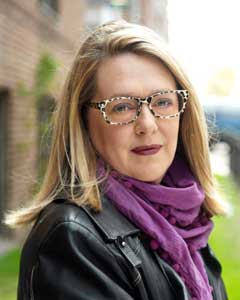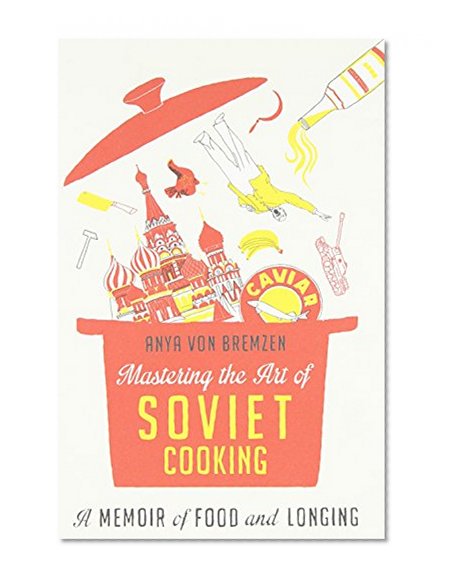Mastering the Art of Soviet Cooking: A Memoir of Food and Longing / Anya Von Bremzen
| List Price: | |
| Our Price: | |
|
Used Book Price: $3.14 | |
| Mastering the Art of Soviet Cooking: A Memoir of Food and Longing / Anya Von Bremzen | |
| Publisher: Crown | |
| Availability: | |
| Sales Rank: 380333 | |
|
Q&A with Anya Von Bremzen

Q. One of your reasons for writing this book was your feeling of leading a double life as a food writer. Can you explain?
A. When I started my career in the early 90s, after emigrating in the 70’s, the Soviet drama of putting food on the table was still fresh. Whenever I ate at a fancy restaurant for my work, I felt pangs of guilt about all my family struggling back in Moscow. Over time Russia became a wealthy country, but I continued to be haunted by a sense that behind everything I ate professionally lay another reality: a shadow of our collective Soviet trauma. Something deeper, more existential, and related to food. This haunting, complicated past, bottled inside of me, finally had to come out.
Q. What surprised you most, writing the book?
A. What I've come to call the “poisoned madeleine” factor. We lived in a state where every edible morsel was politicized and ideologized. And most of our food was produced by the state my mother had reviled and fled. And yet we experience a powerful bittersweet nostalgia for those “poisoned” flavors. The complexity and contradiction of this longing is what I explore in the book. Over pages eating becomes almost a metaphor for ingesting ideology—and for resisting it.
Q. Mastering the Art of Soviet Cooking tells your story, but also the story of three generations of your family. How did you research their experiences?
A. My mother has an almost uncanny recall of her emotional life, starting from her earliest childhood—back when she was an alienated sensitive kid in the totalitarian frenzies under Stalin. Her feeling of being a “dissident-born,” always at odds with Soviet society, has been an incredibly powerful trope for this book. My dad, on the other hand, remembers perfectly all the small physical details: what vodka cost in 1959, for example. And my grandparents were great raconteurs. Even after they were long gone their stories lived on.
Q. You describe, to sumptuous effect, Russian literature’s obsession with food. Who are your favorite Russian authors?
A. I love most the satirical strain in Russian literature. As much as I venerate Tolstoy and Dostoyevsky, it’s Nikolai Gogol, that gluttonous hypochondriac, who’s my guy. Gogol is amazing—delicious!—on food. His Dead Souls essentially chronicles one grifter’s journey from dinner to dinner through the vast Russian countryside.
Q. You’ve spent time in the new Moscow over the last few years. How would you describe contemporary Russian food culture?
A. The last chapter of the book is ironically titled “Putin’ on the Ritz.” That pretty much sums it up. Foie gras and burrata, sushi flown in from Tokyo—it's all there for comrades with serious rubles. And yet, at the same time, there’s this astonishing wave of Soviet nostalgia! Even oligarchs are pining for the mayonnaise-laden salads and kotleti (Russian burgers) of our shared, vanished socialist childhoods.
Q. How did the work of cooking change over time for Russian women?
A. That’s an arc I lay out in the book. The pioneering Bolsheviks of the 1920s wanted to liberate women from domestic chores—and so both my grandmothers were lousy cooks! But the Bolshevik feminist project failed, and by the next decade, under Stalin, Soviet women got stuck where they remained—carrying the infamous “double-burden” of a job and housework. Still. In a society with so much cultural control, some women of my mother's early 60’s generation found personal self-expression in cooking. Now with the avalanche of chichi prepared food at Russian supermarkets, cooking is strictly a matter of choice.
Q. What was the first dish you remember learning?
A. When I was a kid of five, Mom and I lived on one ruble a day—poverty even by Soviet standards. When we completely ran out money Mom would make fried eggs over stale black bread cubes. I watched her make it so many times I could do it blindfolded. And it's still one of my favorite dishes.
Q. What is your favorite dish to cook with your mother?
A. Each chapter of the book has us obsessing about something different—a new “project.” The sumptuous kulebiaka from the pages of our beloved Chekhov drove us crazy but turned out incredibly. And both Mom and I love the spicy exotic flavors from the ethnic rainbow of former Soviet ethnic republics. Chanakhi, a Georgian lamb stew with tons of herbs (Stalin's favorite dish incidentally) is something we cook a lot.
Now you can buy Books online in USA,UK, India and more than 100 countries.
*Terms and Conditions apply
Disclaimer: All product data on this page belongs to
 .
.No guarantees are made as to accuracy of prices and information.










